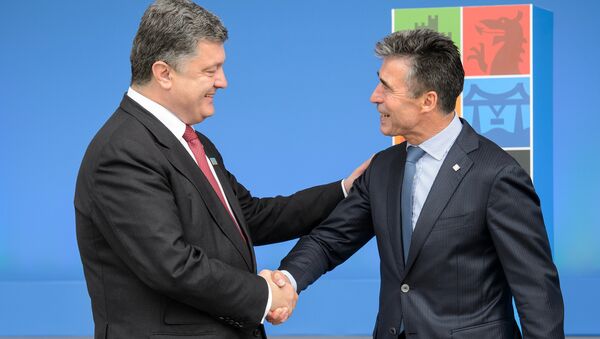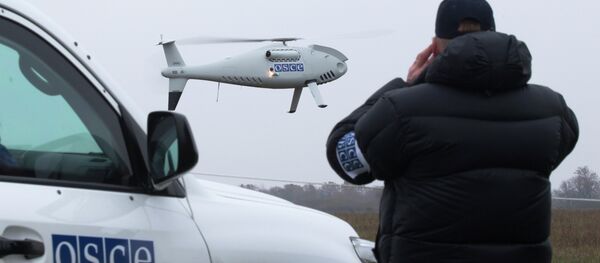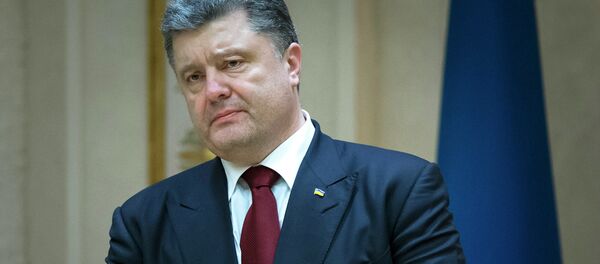BRUSSELS (Sputnik) — Former NATO Secretary General Anders Fogh Rasmussen told Sputnik that he is ready to meet with Russian officials at any level while serving as adviser to Ukrainian President Petro Poroshenko.
"Of course, if that is a wish from the Russian side, I will be more than willing to meet also with Russian officials, obviously,” Rasmussen said.
“I'm prepared to meet whoever might want to meet me,” he stated, noting that developing a strategic partnership between Russia and NATO was one of his priorities as head of the alliance.
"Fundamentally, I am of the view that it would be best for both Russia and us to cooperate instead of having a confrontation. And if, due to my position as adviser to the Ukrainian president, if I could promote that kind of cooperation, I would be delighted to do so,” Rasmussen said.
Rasmussen to Discuss Idea of Arming OSCE Observers in Ukraine With EU
"That’s an example of something very concrete that could be elaborated a bit on. Of course, I will discuss this with my interlocutors both in Ukraine and in Brussels, Berlin and elsewhere how this could be done," he added.
Rasmussen Says to Promote Minsk Deals Implementation as Poroshenko Adviser
"Of course, in an ideal world, we would see an end to the conflict in eastern Ukraine, we would see a peaceful Ukraine within the internationally recognized borders and we would see a reformed Ukraine. That's also part of my job, to help promote reforms in Ukraine, including a determined fight against corruption, to ensure that public services work effectively, that Ukraine gets closer to the European Union if this is their wish. So that will be the ideal situation, stop of the conflict in the east and a profoundly reformed Ukraine," Rasmussen said, noting that the Minsk agreements need to be fulfilled by both sides of the conflict.
The Minsk deal on Ukraine's reconciliation was struck in February 2015 by Russia, Ukraine, Germany and France and later signed by Kiev and the Donbass self-proclaimed republics of Donetsk and Lugansk. Both warring parties have repeatedly accused each other of violating the truce despite agreeing to the ceasefire deal.
The Minsk peace agreements should be implemented at the same time as decentralization reforms in Ukraine, Anders Fogh Rasmussen told Sputnik.
"I think these probably should be done in parallel," Rasmussen said. "Decentralization of Ukraine is very important, but at the same time, security in the East is also very important and the end goal of course is that that the Ukrainians should have full control of the border between Russia and Ukraine, and they don't today."
"So it is understandable that Ukrainian politicians are a bit reluctant to move forward here," he added.
"I had a meeting with the president and his officials and finally we agreed that I could serve as an adviser, who is not part of his cabinet or his joint staff or anything, I’m just an adviser, an external adviser, so to speak," Rasmussen said.
"So, of course, from now on, I will on a regular basis visit Kiev, as well as other European capitals, because I consider my job not only to promote Ukrainian interest but also to get messages from European leaders to the Ukrainian side," he added. "I will also pick up important messages when I visit Western capitals and I will bring these messages to the Ukrainians’ attention."
Crimea, which has a predominately ethnically-Russian population, seceded from Ukraine to rejoin Russia in March 2014, following a referendum in which over 96 percent of voters supported the move.
Rasmussen Says Not to Spend Ukrainian Tax Payers' Money as Adviser to Poroshenko
"In the case that we will need supplementary financing, and I think that we will, I will seek private funding," Rasmussen said.
"To the extent that we will need financing I will seek that financing privately on my own…so the Ukrainian government, the Ukrainian tax payers will not be involved in this," he underlined.
Anders Fogh Rasmussen told Sputnik that he did not consult with the alliance before accepting the offer to serve as adviser to Ukrainian President Petro Poroshenko.
"No, I've never done that, because when you leave NATO there are in fact no written obligations, except, of course, you are not allowed to reveal any secrets and I don't. But apart from that, there are not written rules about what you can and what you can't."




